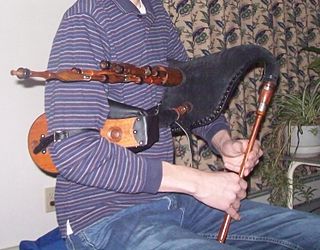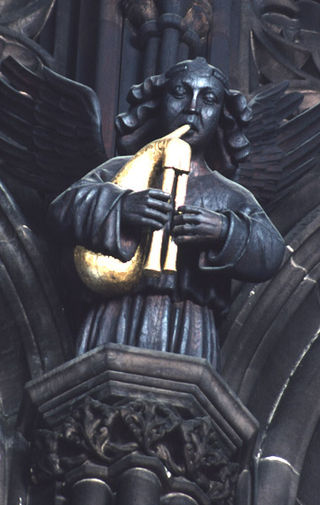
Bagpipes are a woodwind instrument using enclosed reeds fed from a constant reservoir of air in the form of a bag. The Great Highland bagpipes are well known, but people have played bagpipes for centuries throughout large parts of Europe, Northern Africa, Western Asia, around the Persian Gulf and northern parts of South Asia.

The uilleann pipes, sometimes called Irish Bagpipes, are the characteristic national bagpipe of Ireland. Earlier known in English as "union pipes", their current name is a partial translation of the Irish language terms píobaí uilleann, from their method of inflation. There is no historical record of the name or use of the term uilleann pipes before the 20th century. It was an invention of Grattan Flood and the name stuck. People mistook the term 'union' to refer to the 1800 Act of Union; this is incorrect as Breandán Breathnach points out that a poem published in 1796 uses the term 'union'.

The great Highland bagpipe is a type of bagpipe native to Scotland, and the Scottish analogue to the great Irish warpipes. It has acquired widespread recognition through its usage in the British military and in pipe bands throughout the world.

The Scottish smallpipe is a bellows-blown bagpipe re-developed by Colin Ross and many others, adapted from an earlier design of the instrument. There are surviving bellows-blown examples of similar historical instruments as well as the mouth-blown Montgomery smallpipes, dated 1757, which are held in the National Museum of Scotland. Some instruments are being built as direct copies of historical examples, but few modern instruments are directly modelled on older examples; the modern instrument is typically larger and lower-pitched. The innovations leading to the modern instrument, in particular the design of the reeds, were largely taken from the Northumbrian smallpipes.

The border pipes are a type of bagpipe related to the Scottish Great Highland Bagpipe. It is perhaps confusable with the Scottish smallpipe, although it is a quite different and much older instrument. Although most modern Border pipes are closely modelled on similar historic instruments, the modern Scottish smallpipes are a modern reinvention, inspired by historic instruments but largely based on Northumbrian smallpipes in their construction.

The Northumbrian smallpipes are bellows-blown bagpipes from North East England, where they have been an important factor in the local musical culture for more than 250 years. The family of the Duke of Northumberland have had an official piper for over 250 years. The Northumbrian Pipers' Society was founded in 1928, to encourage the playing of the instrument and its music; Although there were so few players at times during the last century that some feared the tradition would die out, there are many players and makers of the instrument nowadays, and the Society has played a large role in this revival. In more recent times the Mayor of Gateshead and the Lord Mayor of Newcastle have both established a tradition of appointing official Northumbrian pipers.

Scotland is internationally known for its traditional music, which remained vibrant throughout the 20th century and into the 21st when many traditional forms worldwide lost popularity to pop music. Despite emigration and a well-developed connection to music imported from the rest of Europe and the United States, the music of Scotland has kept many of its traditional aspects and has influenced many other forms of music.

Battlefield Band is a Scottish traditional music group. Founded in Glasgow in 1969, they have released over 30 albums and undergone many changes of lineup. As of 2010, none of the original founders remain in the band.
Pibroch, piobaireachd or ceòl mòr is an art music genre associated primarily with the Scottish Highlands that is characterised by extended compositions with a melodic theme and elaborate formal variations. Strictly meaning 'piping' in Scottish Gaelic, piobaireachd has for some four centuries been music of the great Highland bagpipe.
Dick Hensold is an American folk musician based in the state of Minnesota. An active promoter of bagpipes, he plays Northumbrian smallpipes, Swedish pipes (säckpipa), medieval great-pipes, reel pipes, Montgomery smallpipes, Great Highland bagpipes, recorder, seljefloyte, low whistle and string bass. He played the Edinburgh Folk Festival in 1994, the Lowland and Border Pipers' Society Collogue in 1997, and has taught Northumbrian smallpipes at workshops in the United States, Canada, and Northumberland.
Gordon Duncan was a Scottish bagpiper, low whistle player and composer, born in Turriff, Aberdeenshire.

Jori Lance Chisholm is an American professional bagpipe player and teacher who lives in Seattle, Washington. Chisholm is a successful solo competitor winning the United States Gold Medal four times and has placed in the top three in Scotland's Argyllshire Gathering Gold Medal competition. He played with the six-time Grade One World Champion Simon Fraser University Pipe Band and was a featured solo performer for the band on multiple occasions. Chisholm has performed in front of sold-out audiences with The Chieftains and with ex-Grateful Dead rocker Bob Weir and his band Ratdog, and has been featured as a soloist or band member on over 20 recordings. His debut solo album Bagpipe Revolution was nominated for Album of the Year by Pipes|Drums magazine. He writes the "Sound Technique" column for the National Piping Centre’s bi-monthly Piping Today Magazine. The New York Times featured Chisholm's online teaching program, BagpipeLessons.com, and described him as a "top-tier teacher" in a front-page story about the growth of Skype music lessons. A cover story in American Profile Magazine named Chisholm one of the "world's elite pipers."
This article defines a number of terms that are exclusive, or whose meaning is exclusive, to piping and pipers.

The MacCrimmons is a Scottish family that served as pipers to the chiefs of Clan MacLeod for several generations. The MacCrimmon kindred was centred at Borreraig near the Clan MacLeod seat at Dunvegan on the Isle of Skye. At Borreraig the MacCrimmons conducted one of the best known "piping colleges" in the Highlands of Scotland.

When bagpipes arrived in England is unknown, there is some evidence to suggest Anglo-Saxon times, however the oldest confirmed proof of the existence of bagpipes anywhere in the world comes from three separate sources in the 13th century. Two of them English; the Tenison Marginalie Psalter from Westminster and an entry into the accounts books of Edward the I of England recording the purchase of a set of bagpipes. The third from the Cantigas Del Santa Maria published in Spain. From the 14th century onwards, bagpipes start to appear in the historical records of European countries, however half the mentions come from England suggesting Bagpipes were more common in England.

The National Piping Centre is an institution in Glasgow, Scotland, dedicated to the playing of the bagpipes, to include not only the Great Highland Bagpipes, but also the Scottish smallpipes and Irish uileann pipes, as well as other traditional musical instruments.
Hugh Robertson (1730–1822) was a Scottish wood and ivory turner and a master crafter of woodwind instruments such as pastoral pipes, union pipes, and great Highland bagpipes.
Colin Ross was an English folk musician who played fiddle and Northumbrian smallpipes. He was a noted maker of Northumbrian smallpipes, border pipes and Scottish smallpipes, and one of the inventors of the modern Scottish smallpipes.

Breabach is a Scottish folk music band formed in 2005. In 2011, they received nominations for ‘Best Group’ at the BBC Radio 2 Folk Awards. They won Scottish Folk Band of the Year in 2012 and Live Act of the Year in 2013 at the Scots Trad Music Awards.
Brìghde Chaimbeul is a Scottish bagpipe player, who plays the traditional Great Highland bagpipe and the revived Scottish smallpipes.













